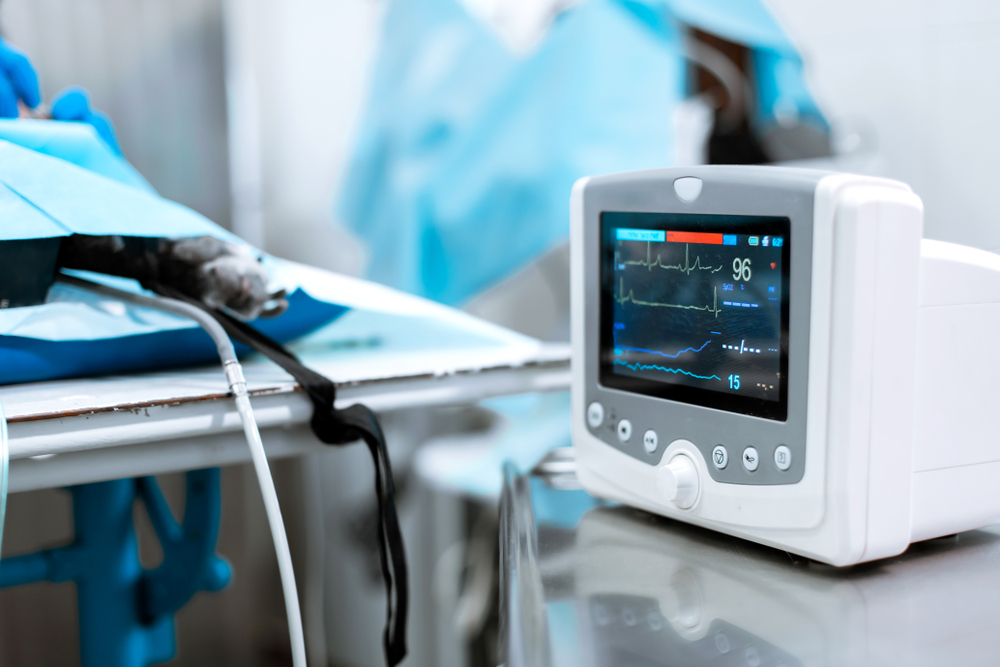Anesthesia is required for many veterinary procedures, and while most pets who undergo anesthesia experience no complications, some risk is involved. Our Caldwell Animal Hospital team wants to help by answering some frequently asked questions about pet anesthesia.
Question: What are the anesthetic risks for pets?
Answer: Anesthesia for pets is generally extremely safe—the anesthetic death risk is about 0.17% in dogs and 0.24% in cats. In healthy pets, these numbers drop to 0.05% and 0.11% for dogs and cats, respectively. Potential complications include:
- Hypotension — Injectable and inhalant anesthetics can decrease cardiac output and systemic vascular resistance, resulting in hypotension. This can result in decreased perfusion to vital organs, such as the brain, heart, and kidneys, causing dysfunction.
- Cardiac arrhythmias — Certain anesthetic agents, surgical stimulation, electrolyte imbalances, acid-base disturbances, blood pressure alterations, and low oxygen delivery can cause cardiac arrhythmias.
- Aspiration pneumonia — Pets who are not fasted appropriately before anesthesia can regurgitate and aspirate their stomach contents, resulting in pneumonia.
- Brain dysfunction — In rare cases, anesthesia can cause postoperative delirium or cognitive dysfunction.
Q: What diagnostics are performed to ensure my pet is safe?
A: We perform several diagnostics beforehand, to ensure your pet is healthy enough to undergo anesthesia. These include:
- Physical examination — We thoroughly evaluate your pet from head to tail to ensure they are not exhibiting any signs that would indicate they are at an increased anesthesia risk. We listen to their heart and lungs, assess their temperature, evaluate their mucous membranes, and palpate their abdomen.
- Weight assessment — We weigh your pet and assess their body conditioning score (BCS) to ensure they are at a healthy weight, and the anesthetic calculations are correct.
- Blood work — We perform a complete blood count (CBC) and a biochemistry profile to assess your pet’s overall health status. We may recommend other blood panels, depending on your pet’s condition.
Some pets also require X-rays, urinalysis, electrocardiogram (ECG), and blood pressure measurement. Our veterinary professionals will determine the safest pre-anesthetic workup based on your pet’s circumstances.
Q: What happens when my pet undergoes anesthesia?
A: Prior to anesthesia, we give your pet a sedative to help lower their stress and ease the induction process. We place an intravenous (IV) catheter to administer medications and fluids, and the anesthetic medication. Once your pet is asleep, we insert an endotracheal tube that will deliver anesthetic gas and provide oxygen.
Q: How is my pet monitored during anesthesia?
A: A veterinary professional closely monitors your pet’s vital signs during anesthesia and adjusts their anesthetic levels as needed. Data monitored include:
- Body temperature — Abnormally increased or decreased body temperatures can result in dangerous complications. We use a temperature probe to closely monitor your pet’s core body temperature.
- Heart rate — Your pet’s heart rate increases above normal when their anesthetic level is too light and decreases when too deep. We closely monitor their heart beats per minute to ensure their appropriate anesthetic plane.
- Electrocardiogram (ECG) — We monitor your pet’s ECG to ensure no cardiac arrhythmia occurs.
- Respiration rate — We measure your pet’s breaths per minute.
- Blood pressure — Appropriate perfusion is important, to prevent complications, and we measure your pet’s blood pressure throughout the procedure.
- Oxygen level — We measure the oxygen amount in your pet’s blood, as well as the expired CO₂, to ensure they remain well oxygenated.
Q: What happens to my pet after the procedure?
A: We place your pet in a quiet recovery area, and a veterinary professional continues to monitor them until they are fully awake. We may administer a reversal agent to help speed their recovery.
Q: Are some pets at higher risk for anesthesia?
A: While any pet can experience anesthetic complications, some pets are at higher risk. These include:
- Overweight pets — During anesthesia, an overweight pet’s heart and lungs have to work harder, which may lead to complications. In addition, anesthesia medications are determined based on lean body mass, and such calculations can be difficult in an overweight pet.
- Brachycephalic breeds — Brachycephalic breeds, such as bulldogs, pugs, and Persian cats, are prone to breathing problems that anesthesia can exacerbate.
- Tiny pets — Small pets, such as puppies, kittens, and toy-breed dogs, are at higher risk, because they are more susceptible to hypothermia during anesthesia.
- Pets experiencing an emergency — Any pet experiencing an emergency situation is at higher risk when undergoing general anesthesia.
- Senior pets — Older pets are at higher risk because they will more likely have an underlying health issue.
- Sick pets — Pets who have an underlying health condition are at higher risk.
Q: How can I decrease my pet’s anesthetic risk?

A: Some anesthetic complications are unavoidable, but steps you can take to decrease your pet’s risk include:
- Maintaining an ideal weight — Ensure your pet remains at an ideal weight, which will not only help prolong their life, but also decrease their anesthesia risk.
- Providing preventive care — Ensure your pet receives the recommended preventive care, including vaccinations, year-round parasite prevention medications, and yearly wellness examinations. Wellness care is the best way to keep your pet healthy and catch health problems in the early stages when they are easier to manage.
- Informing your veterinarian — Inform our veterinary professionals if your pet has reacted to any medication, especially during anesthesia, and ensure they are aware of all your pet’s current medications.
- Following instructions — Follow all pre-anesthesia instructions, such as removing food and water and administering medications appropriately.
Anesthesia is usually a safe process for pets, and following these tips will help ensure your pet recovers quickly. If your pet needs a procedure requiring anesthesia, contact our team at Caldwell Animal Hospital, so we can address your concerns and ensure your pet receives the appropriate care.







Leave A Comment